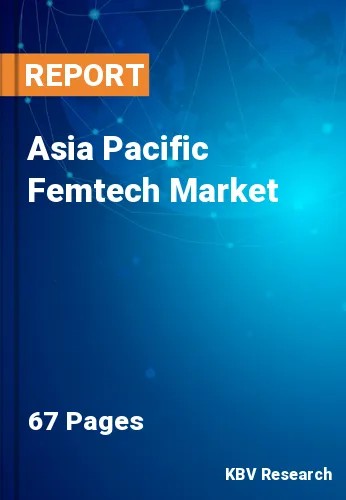The Asia Pacific Femtech Market would witness market growth of 11.5% CAGR during the forecast period (2022-2028).
Clinical diagnostics firms are pushing the scientific envelope to solve unmet medical needs in areas like endometriosis (DotLab) and premature birth (Sera Prognostics). Companies are tackling what were formerly stigmatised topics head on, such as menstruation health (Thinx), pelvic care (Elvie), and menopause (Menopause) (Elektra Health), sexual health (Rosy Wellness). Providing care that is culturally sensitive and tailored for Black women (such as Health in Her HUE), LGBTQ+ populations (FOLX Health), and women in low- and middle-income nations, are important and thus, companies are increasingly investing in the development of such solutions.
Improved consumer-centric products and solutions which understand and target women's distinct healthcare needs can be created through increasing female representation among academics, inventors, investors, and entrepreneurs. Indeed, the market includes not just women consumers, but also payers and providers looking for improved goods and solutions to engage with women end customers more successfully. FemTech solutions are leading to the circumstances for sustained innovation as well as commercial success. Better health results for women can lead to better health outcomes for society because women are not just consumers but also general healthcare decision-makers for themselves and their families. In addition, FemTech is growing to tackle the issue of matching resources and expertise with unmet needs as women's healthcare becomes a higher priority.
Girls may find it difficult to attend school due to a lack of menstruation information, limited access to sanitary supplies, and a hostile school climate. Government and non-governmental organisations in India have devised programmes to lessen the hardship of menstruation for schoolgirls (NGOs). In three Indian states, we wanted to identify menstrual management difficulties and facilitators in schools. The Indian government plays a major role in developing awareness among women related to menstrual hygiene, well-being, and educational achievements, and has formed several programmes to enhance menstrual hygiene management (MHM) in schools, with support from a variety of organisations, aimed at improving knowledge, access, and disposal of menstrual waste, as well as improving sanitation in schools. Women across this region are witnessing various menstrual problems that are motivating them to adopt femtech apps for monitoring their cycle.
The China market dominated the Asia Pacific Femtech Market by Country in 2021, and would continue to be a dominant market till 2028; thereby, achieving a market value of $744.9 Million by 2028. The Japan market is anticipated to grow at a CAGR of 10.8% during (2022 - 2028). Additionally, The India market would display a CAGR of 12.1% during (2022 - 2028).
Based on Product Type, the market is segmented into Wearables and Mobile Apps. Based on Mobile Apps Type, the market is segmented into Fitness & Nutrition, Menstrual Health, Fertility Management/ Assisted Reproductive Technology Apps, Pregnancy Tracking & Postpartum Care, Menopause, Disease Management, and Others. Based on countries, the market is segmented into China, Japan, India, South Korea, Singapore, Malaysia, and Rest of Asia Pacific.
Free Valuable Insights: The Worldwide Femtech Market is Projected to reach USD 10.1 Billion by 2028, at a CAGR of 10.6%
The market research report covers the analysis of key stake holders of the market. Key companies profiled in the report include Google LLC, HeraMED Ltd., iSono Health, Inc., Clue by Biowink GmbH, Chiaro Technology Ltd., Natural Cycles USA Corp., Flo Health UK Limited, Glow, Inc., and Withings France SA.
By Product Type
By Country
Our team of dedicated experts can provide you with attractive expansion opportunities for your business.

